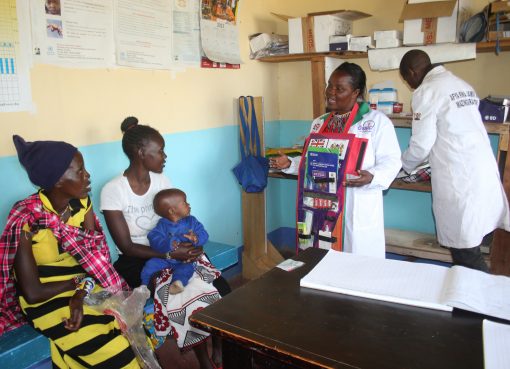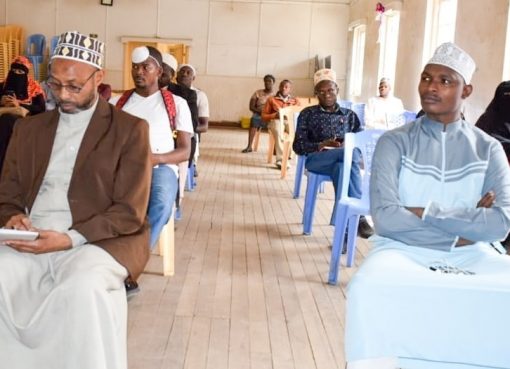

Sometimes life could be very unfair. Imagine a teenage mother sleeping on the streets with her baby, imagine her being rejected by all including her mother.
That’s what happened to Lillian Moraa, an 18 year old who lives on the streets of Nakuru together with her 13 months’ old child.
Ideally, she should still be under the safe custody of her parents, but she is not. Instead, she is hustling to get some daily bread for herself and the baby.
For Lillian, life has given her a beating, she doesn’t care about the luxury of sleeping in a warm bed, or having a roof over her head. That may be too big a dream, in her present circumstances.
A basic meal, some basic clothing is all that concerns her. She knows too well that even getting those is a daily struggle, and sometimes, even a decent meal is not an assurance. Once in a while, a Good Samaritan drops a toy for her child, and sometimes, she also gets some clothing.
She has found herself in a situation where she doesn’t worry about tomorrow. She has seen so much in her tender life, including a community that is indifferent to her and many others who have found a home on the cold bare streets of all major towns. The only home she knows, is a cold slab on the pedestrian fly over along the busy Nakuru – Nairobi highway that leads to Nakuru County Referral Hospital.
Sitting beside the busy Highway with her 13 months’ old baby, Lillian narrates how she ended up being in the streets of Nakuru. She remembers the events that led to her being chased away from her home in Keumbu, Kisii County, soon after her parents found out that she was pregnant.
Lillian, who was then a standard 7 pupil, told KNA that she was rejected by her parents and relatives, all her friends did not want to be associated with her, while the person responsible for her situation also took off.
She says the man responsible was a Tanzanian national who was studying at a college in Kisii. She suspects that he went back to his home country.
As if she wasn’t facing enough challenges already, her mother and uncles tried talking her into aborting the baby and when she would have none of it, she ran away from home.
“It was too scary for me to imagine terminating the life of my unborn baby. I took refuge in the streets after my mother and uncles persistently demanded that I terminate the pregnancy,” she narrates.
Even after delivering a bouncing baby girl who she christened her Selina, Lillian’s uncles kicked her out from their home when she retraced her steps back to her roots of origin.
“I delivered without complications. I had the urge to reconnect with my parents and family but they still rejected me,” she says.
The first born in a family of six was treated like an outcast and denied basic amenities such as food, clothing and shelter.
Her situation was further aggravated by constant beatings and taunting from her uncles and when she could no longer bear it, she took her baby and left again, unsure of where she would lay her head and that of her baby.
Back on the streets, life is not a walk in the park, and it takes courage to survive. She has to contend with constant harassment from more mature street children, some who are misled by opportunists out to make quick bucks from their misery.
Lillian remembers one incident in which a fellow street girl engaged her in a vicious fight during which she lost two teeth. Her main interest was in getting hold of Moraa’s baby. She would later find out that the street girl had a deal with some suspected kidnappers who wanted to kidnap her baby.
She is wary of any strangers approaching her and says that she would defend her baby with her life if need be.
Lillian admits that it is extremely dangerous to live on the streets, and especially for young babies who are exposed to erratic weather patterns, exposure to hard drugs and criminals.
“Babies are exposed to the cold nights, rainy seasons and exposure to drug use which a menace to their health. I wish we could bring them up in secure environments. If I could get a well-wisher to shelter me and my baby, and help me with capital to start a small business, life would be more manageable,” Lillian says.
She still keeps her hopes alive that one day, her life will take a turn for the better. She is hopeful that her daughter can lead a better life, and possibly make better choices in her life. Until that happens, all she can do is take a day at a time.
The Nakuru County Director of Children’s Services, Mwambi Mong’are is well aware of the street children and says the issue remains a major challenge for both National and County governments.
Despite efforts to round up and rehabilitate the street children, Mwambi says the problem remains a thorny issue as children always find their way back to the streets.
He cited a recent operation that they conducted in which 100 street children were rounded up and taken to various rehabilitation centres and children’s home. However, a short while later, some of the children escaped from their new homes and returned to the streets.
The Children’s officer says that financial capacity to rehabilitate the street children is still a major challenge due to limited funding. He is hopeful that the County government will establish its own rescue centre where it will be easier to manage the children and give them some formal training and life support skills.
Currently, children are placed in various children’s homes, some of which are financially limited to offer quality services. Some of these homes thus provide only basic needs but do not have capacity to offer vocational training.
He adds that due to long periods of exposure to hard drugs, the street children must undergo rehabilitation and counselling before they could be taken through any meaningful reform programme. Addiction to hard drugs is one of the reasons that causes these children to return to the streets where drugs are easily available.
His office faces another challenge of identifying genuine street children, saying that some of them had homes where they retired to for the night and only came to the streets to beg.
The Director however, expressed hope that his office in liaison with the county government would put up a sustainable long term programme that will see a sizeable number of the children rehabilitated and helped to start a normal life.
“The number of street mothers is rising and hence the need to come up with a programme that will enable them and their children be taken to rehabilitation and rescue centres,” he added.
By Jane Ngugi/Collins Ogutu



